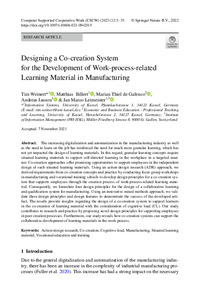| dc.date.accessioned | 2023-07-24T15:15:16Z | |
| dc.date.available | 2023-07-24T15:15:16Z | |
| dc.date.issued | 2022-01-12 | |
| dc.identifier | doi:10.17170/kobra-202305238082 | |
| dc.identifier.uri | http://hdl.handle.net/123456789/14921 | |
| dc.description.sponsorship | Gefördert im Rahmen des Projekts DEAL | ger |
| dc.language.iso | eng | |
| dc.rights | Namensnennung 4.0 International | * |
| dc.rights.uri | http://creativecommons.org/licenses/by/4.0/ | * |
| dc.subject | action-design research | eng |
| dc.subject | co-creation | eng |
| dc.subject | cognitive load | eng |
| dc.subject | manufacturing | eng |
| dc.subject | situated learning material | eng |
| dc.subject | vocational education and training | eng |
| dc.subject.ddc | 004 | |
| dc.subject.ddc | 370 | |
| dc.subject.ddc | 670 | |
| dc.title | Designing a Co-creation System for the Development of Work-process-related Learning Material in Manufacturing | eng |
| dc.type | Aufsatz | |
| dcterms.abstract | The increasing digitalization and automatization in the manufacturing industry as well as the need to learn on the job has reinforced the need for much more granular learning, which has not yet impacted the design of learning materials. In this regard, granular learning concepts require situated learning materials to support self-directed learning in the workplace in a targeted manner. Co-creation approaches offer promising opportunities to support employees in the independent design of such situated learning materials. Using an action-design research (ADR) approach, we derived requirements from co-creation concepts and practice by conducting focus group workshops in manufacturing and vocational training schools to develop design principles for a co-creation system that supports employees through the creation process of work-process-related learning material. Consequently, we formulate four design principles for the design of a collaborative learning and qualification system for manufacturing. Using an innovative mixed methods approach, we validate these design principles and design features to demonstrate the success of the developed artifact. The results provide insights regarding the design of a co-creation system to support learners in the co-creation of learning material with the consideration of cognitive load (CL). Our study contributes to research and practice by proposing novel design principles for supporting employees in peer creation processes. Furthermore, our study reveals how co-creation systems can support the collaborative development of learning materials in the work process. | eng |
| dcterms.accessRights | open access | |
| dcterms.creator | Weinert, Tim | |
| dcterms.creator | Billert, Matthias Simon | |
| dcterms.creator | Thiel de Gafenco, Marian | |
| dcterms.creator | Janson, Andreas | |
| dcterms.creator | Leimeister, Jan Marco | |
| dc.relation.doi | doi:10.1007/s10606-021-09420-5 | |
| dc.relation.projectid | Grant no. 01BE17008A | |
| dc.subject.swd | Verarbeitende Industrie | ger |
| dc.subject.swd | Lernen | ger |
| dc.subject.swd | Digitalisierung | ger |
| dc.subject.swd | Kognitiver Prozess | ger |
| dc.subject.swd | Lehrmittel | ger |
| dc.subject.swd | Berufsbildung | ger |
| dc.type.version | publishedVersion | |
| dcterms.source.identifier | eissn:1573-7551 | |
| dcterms.source.issue | Issue 1 | |
| dcterms.source.journal | Computer Supported Cooperative Work | eng |
| dcterms.source.pageinfo | 5-53 | |
| dcterms.source.volume | Volume 32 | |
| kup.iskup | false | |


